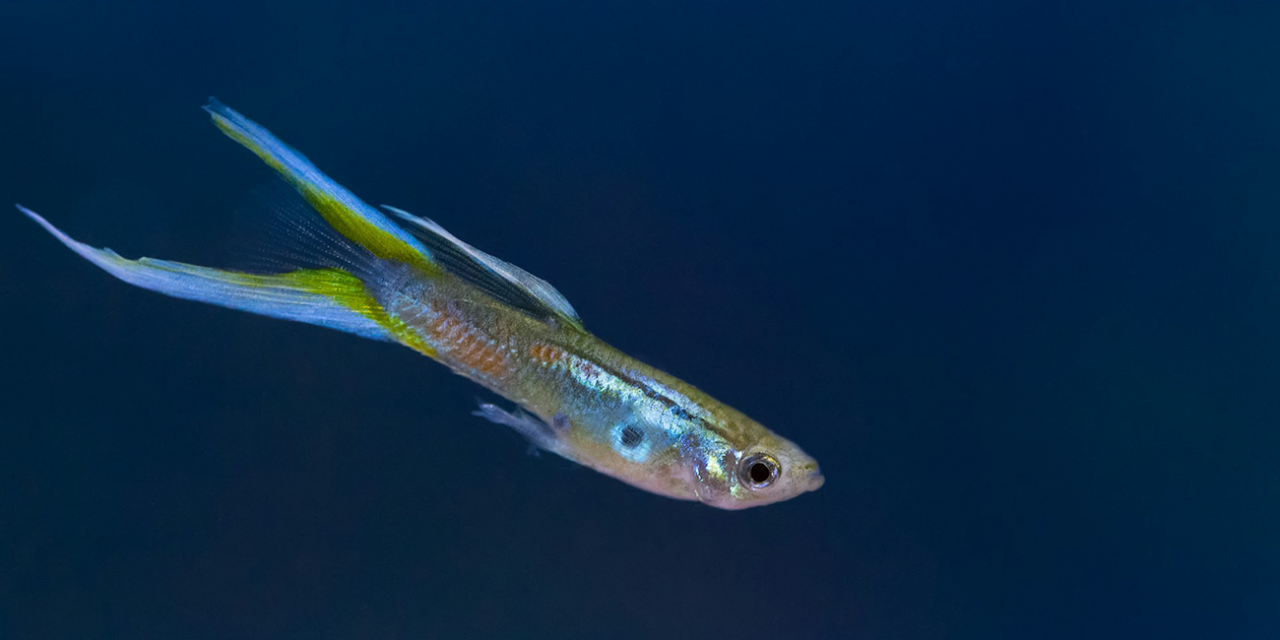Exploring the world of guppy care is a delightful experience that I’m always eager to share.
For nearly two decades, I’ve been immersed in the delightful world of guppy care, finding joy in every moment spent with these vibrant, colorful fish.
- Guppies, also known as “million fish” and “rainbow fish,” are among the world’s most widely kept tropical freshwater fish.
- They are different from most fish in that they are livebearers and birthfries to raise to a larger size. In the wild, guppies come from Brazil, Jamaica, Trinidad, and many other nations.
- Guppies are a delight with their myriad of vibrant colors and their social nature as community-dwelling fish.
- Their love for swimming together makes them a lively addition to any tropical fish tank.
When purchasing, try to source your fish from local breeders sold at pet shops instead of imported guppies.
Table of Contents
5 Guppy Care Sheet Quick Points
- Heating & Light — 76° Fairenheit optimum temperature with a 70-78° Fairenheit livable range.
- Tank Size — 5 gallons minimum for an initial group of three guppies, with at least 1 gallon dedicated to every additional guppy added to the aquarium tank.
- Feeding—Feed tropical or livebearing fish food (smaller pellets designed for smaller fish) with occasional bloodworms and brine shrimp. Feed twice a day, offering as much food as your guppies can consume within two minutes. Overfeeding can lead to water quality problems and issues that are difficult to resolve, so it is important to remove any uneaten food after feeding.
- Cleaning — Filter your aquarium water continually and clean the tank with a 25% water change (conditioned) weekly for optimum health.
- Housing & Environment—The water in your guppy aquarium should have a pH between 7.0 and 7.2. Maintaining the right pH level is crucial as it affects the guppies’ immune system, digestion, and overall health. A stable and good pH level is super important for the health and well-being of your guppies, as it helps them maintain their internal balance and resist diseases.
Healthy guppies should actively swim around the tank more towards the surface.
They should have vibrant colors and a healthy appetite.
It could be ill if you find your guppy lethargically swimming near the bottom of the tank. Occasionally, a lethargic guppy can be a sign of pregnancy.
Other signs of a healthy guppy include clear and bright eyes, intact fins, and a sleek body without any visible growths or parasites.
How do you maintain guppies?
Maintaining guppies is like tending to a small, vibrant garden in your home.
With the right water temperature, weekly water changes, daily feedings, and appropriate pH levels, your guppies will thrive. Here are some key points to help you maintain your guppies:
- Water Temperature: Keep the water temperature around 76°F, with a livable range between 70-78°F. Use an aquarium heater that has a thermostat to maintain this stable temperature.
- Weekly Water Changes: Perform a 25% water change weekly to maintain water quality. Use a water conditioner to treat tap water before putting it in the tank, removing harmful chlorine and chloramines.
- Daily Feedings: Feed your guppies twice a day with high-quality tropical fish flakes or pellets. Occasionally, beef up their diet with live or frozen foods like bloodworms and brine shrimp. Offer only as much food as your guppies can consume within two minutes to prevent overfeeding.
- pH Levels: Maintain a pH level between 7.0 and 7.2. Use a pH testing kit to monitor and adjust the pH as needed, ensuring it stays within this range.
- Observation is key to guppy care. Healthy guppies are active and swim near the surface. They should have vibrant colors and a healthy appetite. Monitor for signs of illness that could come your way, such as lethargy or unusual swimming patterns, to ensure their well-being.
- Tank Size: It’s probably best to begin with a minimum of a 5-gallon tank for an initial group of three guppies, adding an extra gallon for each additional guppy.
- Filtration: Ensure your aquarium is equipped with a good filtration system to keep the water clean and free from harmful toxins.
- Social Environment: Guppies are social fish that thrive in a community setting. Ensure that tank mates are compatible, avoiding aggressive species.
Guppies will live for 1-3 years if cared for well.
Their care is relatively straightforward, making them a really great choice for both novice and experienced aquarists.
By providing a stable environment with proper water conditions and a balanced and good diet, you can enjoy the vibrant presence of guppies in your aquarium for years to come.
Are guppies easy to take care of?
Guppies are a delight to keep, and their care is refreshingly straightforward, making them an ideal choice for both novice and experienced aquarists.
Their care is not overly complicated, providing a sense of reassurance and confidence to the keeper.
Their primary difference from commonly kept goldfish is that they are tropical freshwater fish and must be kept in the mid-70s, most often listed as 76 degrees Fahrenheit as optimum. You’ll want a heater in your tank with a thermostat to maintain an even temperature.
How many guppies should be kept together?
Guppies are community-oriented fish so that you can start with an initial group of three guppies in a five-gallon aquarium and an additional gallon for every guppy added.
Guppies are prolific breeders, so you can keep three male guppies to ensure you won’t have any surprise offspring, although male guppies are more territorial than female guppies.
If you keep males and females together, keep at least two females per male guppy so the females don’t become too tired from being chased.
Male guppies are bright and colorful, while females are more muted and earthy in color tones.
How do I know if my female guppy is pregnant?
Identifying pregnancy in female guppies involves observing specific physical changes.
Here are the key signs to look for:
- Larger Stomach: Your guppie’s stomach will become noticeably larger as she carries the developing fry.
- Gravid Spot: A dark spot, known as the ‘gravid spot,’ will appear on her abdomen. This spot is located near the back of the stomach, just above the anal fin. It’s a small, dark area that becomes more prominent as the pregnancy progresses.Changes in Gravid Spot: The closer the pregnancy is to term, the larger and darker the gravid spot will become. In later stages, you may even start to see the eyes of the fry through the skin of the female’s body.
- Behavioral Changes: Pregnant guppies may show changes in behavior, such as becoming more reclusive or spending more time near the heater or plants.
- Body Shape: The female’s body may take on a more squared-off appearance when viewed from the side, especially as she gets closer to giving birth.
By keeping a really good eye on these signs, you can determine if your female guppy is pregnant and prepare accordingly to ensure a safe environment for both the mother and the upcoming fry.
Can guppies survive in tap water?
Yes, guppies can survive in tap water, but it requires proper treatment and preparation to ensure their safety and health.
Here are the key steps to make tap water safe for guppies:
- Water Conditioner: Before adding tap water to the aquarium, try and treat it with a water conditioner to remove chlorine, chloramines, and other harmful chemicals that can be toxic to guppies.
- Temperature Matching: Ensure the tap water is brought to the same temperature as your tank water before adding it. This helps prevent shocking your fish’s systems due to sudden temperature changes.
- pH Adjustment: Check and adjust the pH level of the tap water to match the optimal range for guppies, which is between 7.0 and 7.2.
- Aeration: Allow the treated tap water to sit and aerate for a few hours before adding it to the tank. This helps to further dissipate any remaining chlorine and stabilize the water conditions.
By following these steps, you can safely use tap water for your guppy aquarium and provide a healthy environment for your fish.
If you’re new to guppy care, a little research and time investment will go a long way in ensuring your guppies lead a long, happy, and healthy life in your home. The time spent learning is as rewarding as the destination!





